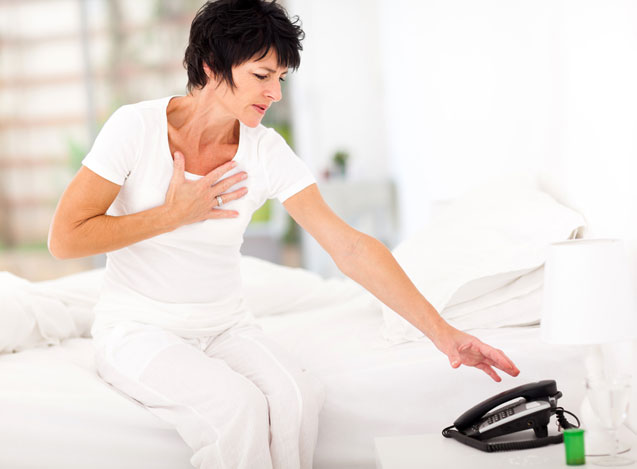In the movies, a heart attack is always easy to spot. The individual clutches at their chest with a pained expression on their face before tumbling to the floor while muttering “I’m having a heart attack” through clenched teeth.
The reality? It’s rarely like that.
In the United States, someone suffers a myocardial infarction (the medical term for a heart attack) every 43 seconds. Distinct from cardiac arrest – when the heart stops beating – a heart attack occurs when the oxygen-rich blood flow to the heart is restricted or cut off because of narrowed or clogged arteries.
And despite what Hollywood may have you believe, heart attacks do not always announce themselves. In fact, the female heart attack is often lacking several if not all “traditional” symptoms. Discomfort in the chest – often described as pressure, pain, or tightness – is much more common in men.
Women and Heart Disease
Heart disease is the number one killer of women in the US, even though many believe that position to belong to breast cancer.
There are roughly eight million American women living with heart disease, and it claims an average of 300,000 lives every year. That’s about one every 105 seconds.
And despite the fact we often think of heart disease as a male issue, women are more likely to die as a result of a heart attack than men.
Heart disease – the clogging or hardening of arteries called atherosclerosis and the resulting ischemia (when the arteries are no longer able to adequately supply blood to the heart) – is a silent killer.
Protect yourself, and learn the typical female symptoms before it happens to you.
Female Heart Attack Symptoms
While men usually experience chest discomfort, shortness of breath, and pain in their left arm, 43% of female heart attack victims don’t experience chest pain at all. This leads many to dismiss the symptoms they do experience as no big deal, costing them valuable time before they ultimately decide to seek medical assistance.
Although there is, of course, no definitive list of symptoms that every woman will experience, these are the most common:
- Women MAY experience mild pain in their chest during a heart attack, but it more frequently is located in their jaw, neck, shoulder, or back.
- While men often have pain in their left arm, women may have it in either arm during an event
- Stomach discomfort – nausea, heartburn, indigestion, or even vomiting.
- Many women report unusual sleeplessness or insomnia in the weeks before a cardiac event.
- Up to 70% of women experience exhaustion or fatigue in the days – or even weeks – before the attack itself.
- Cold sweats (different from perspiration as a result of exercise or strenuous work), pale complexion, or an ashen appearance.
- Sudden onset dizzy spells.
- Difficulty catching the breath or inability to carry on a normal conversation or casual activity without feeling “winded” is noted in about 60% of female heart attack cases.
- Many women report anxiety or a general feeling of dread beforehand.
One of the biggest challenges with female heart attack victims is the tendency to dismiss these symptoms as par for course. Many women feel exhausted, anxious, and mildly uncomfortable at the best of times, so they ignore the warning signs when they happen.
If you experience any combination of these symptoms for more than a few minutes, get help. Don’t dismiss it. Don’t second-guess or assume it’s nothing.
Call 911 (again, in order to avoid inconveniencing anyone, many women opt to drive themselves to the ER if they go at all…don’t. You can get invaluable medical aid in an ambulance while en route).
The accepted wisdom suggests chewing a full-strength aspirin with some water as soon as you become concerned that you may be having a heart attack. It works to prevent blood clots and reduces platelet activity that could further reduce blood flow to the heart. Just remember to chew and not swallow – chewing the aspirin results in 50% less platelet activity within five minutes, compared to 12 minutes for pills swallowed whole. Those seven minutes could be the difference between life and death.
Finally, don’t allow anyone to dismiss your concerns at the hospital. Because the female symptoms aren’t generally as severe as those in men, it’s sometimes easy for nurses and even doctors to slot you further down the list of priorities. Insist on seeing a cardiologist, get an EKG and blood test to check for heart damage.
Check out the American Heart Association for more information on heart attack symptoms, diagnosis, and treatment.
It’s your life. Watch for the red flags, react to the signs, and get the help you need.

